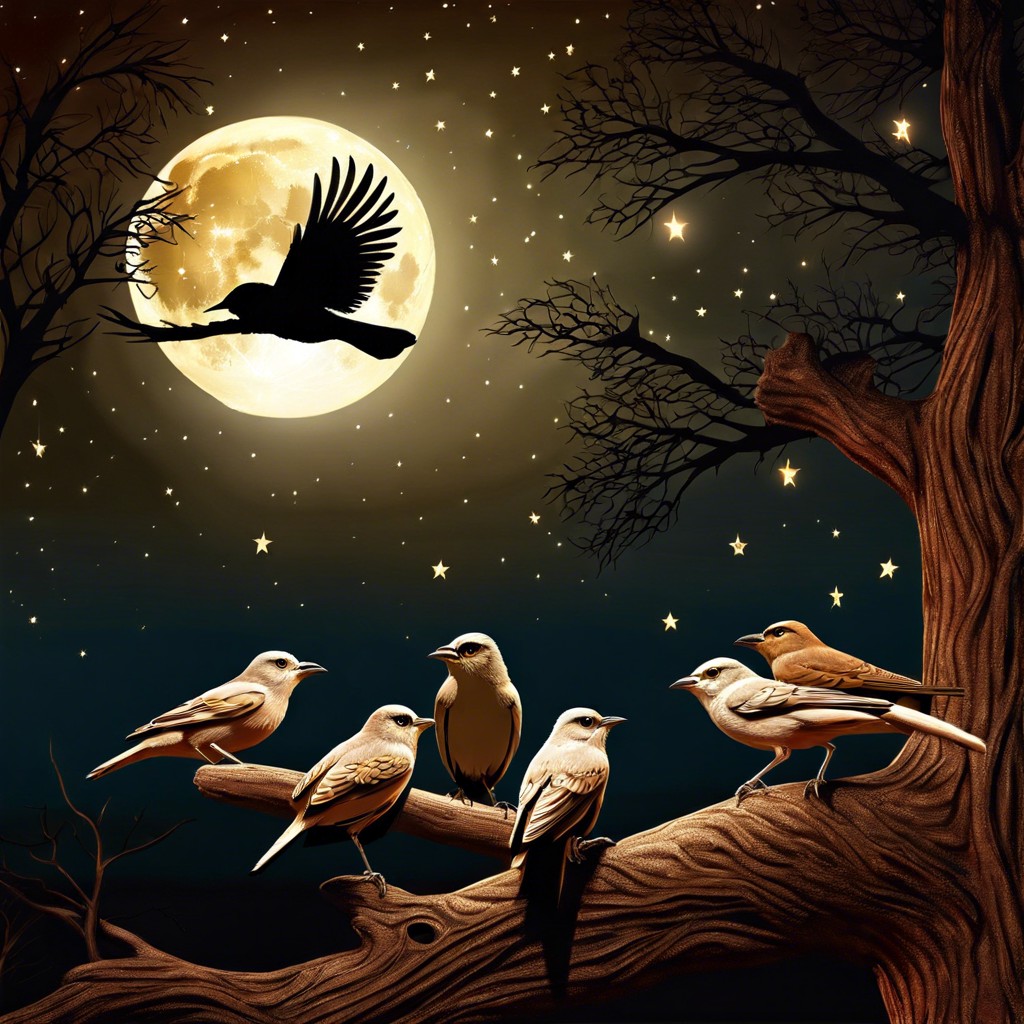Understanding why birds chirp at night can offer profound insights into their symbolic and spiritual meanings.
When night descends and birds begin to chirp, it may feel mysterious or even magical. Nocturnal bird songs have long been considered messengers of intuition, transformation, and spiritual awakening. In various cultures, these night-time melodies carry profound symbolism and deep connections to moon phases and mindfulness. Explore the hidden meanings and messages behind these enchanting sounds, and discover how they encourage presence and spiritual growth. Dive into this article for a captivating journey through the mystique of birds chirping at night.
Key takeaways:
- Nocturnal bird songs signify messages and intuition.
- Night bird sounds symbolize transformation and awakening.
- Bird chirps encourage presence and mindfulness.
- Different cultures associate night bird songs with symbolism.
- Moon phases influence nocturnal bird behavior and spiritual connections.
Spiritual Significance of Nocturnal Bird Songs

Birds singing at night often sparks curiosity and wonder. It’s more than just an oddity of nature; these nocturnal melodies can carry deep spiritual meanings.
Firstly, they are often seen as messengers. A bird chirping in the night might signify an important message from the spiritual realm. This could be a call to pay attention to your intuition and inner voice.
Secondly, nocturnal bird songs can symbolize transformation. The night, often associated with mystery and the unknown, combined with the beauty of bird song, can represent an awakening or a significant transition in your life.
Lastly, they may serve as reminders of presence and mindfulness. When everything else is quiet, the lone bird’s chirp invites focus and reflection, urging you to be present in the moment.
These points invite reflection and the search for deeper meanings behind the enchanting nighttime serenades.
Common Birds Known for Chirping At Night
Many people are surprised to hear birds chirping after dark, assuming they should be silent until dawn. However, a few common species buck this trend.
The nightingale is perhaps the most famous nocturnal singer, its name synonymous with night-time serenades. Known for its powerful and beautiful song, it often sings to attract mates.
Mockingbirds are another known for their night-time melodies. These birds can mimic the songs of other birds, adding variety to their nocturnal performances. Often, they sing after a bright, full moon or in urban areas with lots of artificial light.
Owls, particularly the Eastern Screech Owl, are more commonly associated with eerie hoots and calls. Their vocalizations serve as effective communication in the dark, often to mark territory.
Understanding these nocturnal singers can add an extra layer of mystery and enchantment to nights spent outdoors. Each bird’s song carries its own unique rhythm and purpose, creating a nighttime soundtrack that few take the time to appreciate.
Historical and Cultural Interpretations
Throughout history, different cultures have infused nighttime bird songs with rich symbolism and meaning.
In ancient Roman culture, the nightingale’s song was a harbinger of good fortune. Its melodious notes were believed to bring messages from the gods, often interpreted as prophecies.
Native American tribes, like the Hopi, considered the calls of nocturnal birds as spiritual guides. They believed these songs carried messages from ancestors, urging listeners to heed their wisdom.
In Eastern traditions, owls vocalizing at night were often linked with protection and watchfulness. They are seen as protectors, guarding against unseen dangers in the dark.
The mystic Sufis interpreted the night bird’s call as a symbol of the soul’s quest in the darkness of the material world, seeking the divine.
Understanding these interpretations can provide a deeper spiritual context to the soothing yet mysterious sounds that fill the night.
Role of Moon Phases in Nocturnal Bird Behavior
Birds’ nocturnal chirping often coincides with specific moon phases, sparking curiosity and wonder. The full moon, in particular, seems to amplify their activity. This heightened visibility and ethereal light may embolden birds to sing more freely.
New moons, shrouded in darkness, invite introspection and subtle communication. Some birds may take this quieter phase to change their call patterns, resonating deeper with the night’s stillness.
Waxing and waning moons influence energy and behavior in nature. During these phases, bird songs may signal gradual transitions, reflecting nature’s ebb and flow.
Understanding these patterns can offer us a unique connection to the cycles of both nature and spirit, encouraging a harmonious embrace of the night.
Using Bird Songs for Spiritual Guidance
Listening to bird songs at night can be a powerful tool for spiritual guidance. Here’s how to harness this unique natural occurrence:
First, consider the type of bird you hear. Each species embodies different spiritual meanings. Owls, for instance, often symbolize wisdom and intuitive insight. On the other hand, nightingales could indicate healing and personal transformation.
Secondly, pay attention to the timing and frequency of the chirps. Repeated calls might suggest persistence or urgency, guiding you to focus on immediate priorities or long-neglected tasks.
Lastly, use these nocturnal melodies to enhance your meditation or prayer practices. Sit quietly, breathe deeply, and allow the bird songs to guide your thoughts and inner reflections. The gentle sounds can deepen your connection with nature, promoting inner peace and clarity.
Incorporating these aspects can enrich your spiritual journey, offering subtle insights and comfort through the serene beauty of nocturnal bird songs.





